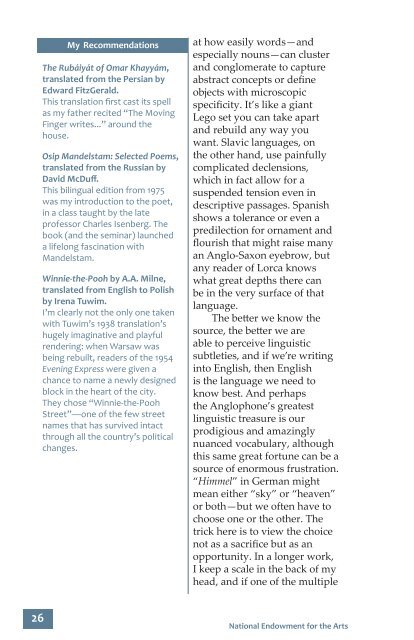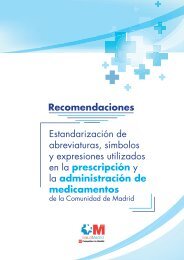lKd7nD
lKd7nD
lKd7nD
You also want an ePaper? Increase the reach of your titles
YUMPU automatically turns print PDFs into web optimized ePapers that Google loves.
My Recommendations<br />
The Rubáiyát of Omar Khayyám,<br />
translated from the Persian by<br />
Edward FitzGerald.<br />
This translation first cast its spell<br />
as my father recited “The Moving<br />
Finger writes...” around the<br />
house.<br />
Osip Mandelstam: Selected Poems,<br />
translated from the Russian by<br />
David McDuff.<br />
This bilingual edition from 1975<br />
was my introduction to the poet,<br />
in a class taught by the late<br />
professor Charles Isenberg. The<br />
book (and the seminar) launched<br />
a lifelong fascination with<br />
Mandelstam.<br />
Winnie-the-Pooh by A.A. Milne,<br />
translated from English to Polish<br />
by Irena Tuwim.<br />
I’m clearly not the only one taken<br />
with Tuwim’s 1938 translation’s<br />
hugely imaginative and playful<br />
rendering: when Warsaw was<br />
being rebuilt, readers of the 1954<br />
Evening Express were given a<br />
chance to name a newly designed<br />
block in the heart of the city.<br />
They chose “Winnie-the-Pooh<br />
Street”—one of the few street<br />
names that has survived intact<br />
through all the country’s political<br />
changes.<br />
at how easily words—and<br />
especially nouns—can cluster<br />
and conglomerate to capture<br />
abstract concepts or define<br />
objects with microscopic<br />
specificity. It’s like a giant<br />
Lego set you can take apart<br />
and rebuild any way you<br />
want. Slavic languages, on<br />
the other hand, use painfully<br />
complicated declensions,<br />
which in fact allow for a<br />
suspended tension even in<br />
descriptive passages. Spanish<br />
shows a tolerance or even a<br />
predilection for ornament and<br />
flourish that might raise many<br />
an Anglo-Saxon eyebrow, but<br />
any reader of Lorca knows<br />
what great depths there can<br />
be in the very surface of that<br />
language.<br />
The better we know the<br />
source, the better we are<br />
able to perceive linguistic<br />
subtleties, and if we’re writing<br />
into English, then English<br />
is the language we need to<br />
know best. And perhaps<br />
the Anglophone’s greatest<br />
linguistic treasure is our<br />
prodigious and amazingly<br />
nuanced vocabulary, although<br />
this same great fortune can be a<br />
source of enormous frustration.<br />
“Himmel” in German might<br />
mean either “sky” or “heaven”<br />
or both—but we often have to<br />
choose one or the other. The<br />
trick here is to view the choice<br />
not as a sacrifice but as an<br />
opportunity. In a longer work,<br />
I keep a scale in the back of my<br />
head, and if one of the multiple<br />
26<br />
National Endowment for the Arts



